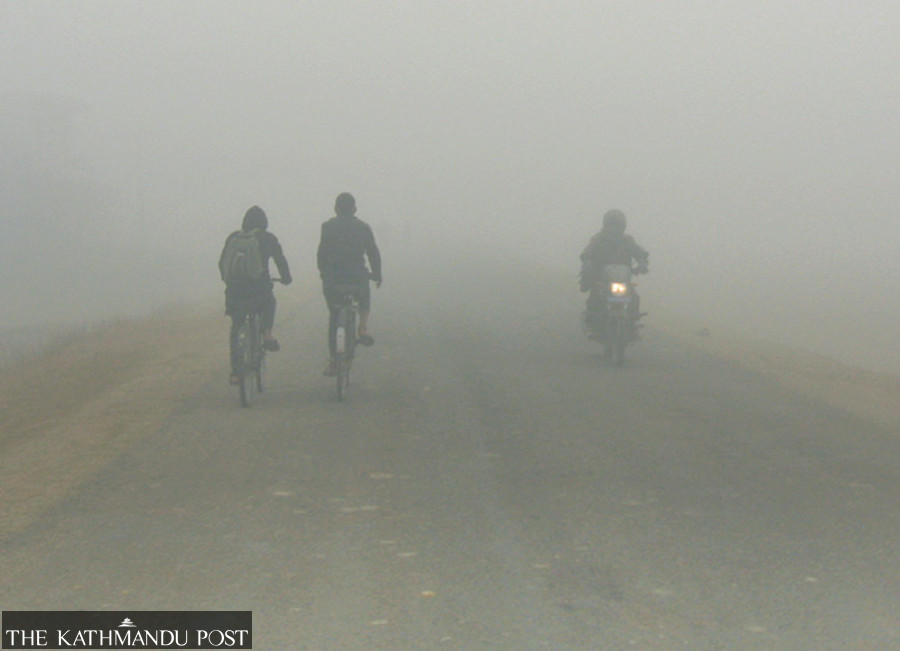Health
As winter sets in, doctors recommend flu shots for children, elderly, and comorbid
Influenza cases have been rising since October, and doctors warn of further surge in the coming days.
Arjun Poudel
Amid a decline in temperatures, the number of people suffering from influenza and other respiratory ailments has risen. Hospitals treating respiratory patients say there has been an increase in flu and other respiratory illnesses compared to a few days ago.
“A rise in cases of respiratory illnesses during winter or at the time of season change is not uncommon,” said Dr Ram Hari Chapagain, a senior consultant paediatrician at the Kanti Children’s Hospital. “Parents should not take these problems lightly, as children can sometimes develop severe symptoms.”
Seasonal influenza is also highly contagious. It mainly affects the lungs and spreads quickly in communities. Its symptoms include fever, cough, body aches, and in some cases, vomiting and diarrhoea, and pneumonia.
Pneumonia, an infection of the lungs caused by various types of bacteria, viruses and fungi, is the leading cause of death among children under five in Nepal. It kills more children annually than malaria, tuberculosis and HIV combined. According to the World Health Organisation, pneumonia accounts for 15 percent of under-five mortality.
Doctors say pneumonia caused by bacteria is deadlier than that caused by viruses, and children under five and people above 65 years of age are highly vulnerable to the disease.
Thousands of people across the country contract pneumonia every year. The average cost of hospitalisation for pneumonia is Rs13,250, which is nearly half the average monthly household expenses in Nepal, a study by Pneumo Nepal shows.
The study—which was carried out at Patan Hospital, Kanti Children's Hospital, Mission Hospital in Palpa, Bheri Hospital in Nepalgunj, and BP Koirala Institute of Health Sciences—shows that unexpected medical costs often push families into poverty.
Doctors warn that if seasonal influenza is left untreated, it can cause pneumonia, which can be fatal. Doctors say seasonal influenza affects not only children but also comorbid and elderly people equally.
Although Nepal has no system in place to track influenza infections, severity, and deaths from influenza viruses, many people get severe infection from the disease, according to them.
“We don’t know exactly how many people get infected, develop severe symptoms, or succumb to seasonal influenza each year in Nepal, as we do not maintain detailed records,” said Dr Anup Subedee, an infectious disease expert. “But the fact is small children, elderly people and those with underlying conditions are highly vulnerable.”
Experts say most children recover within a few days of infection, but the virus could be severe to elderly people and those with underlying conditions.
“The number of people suffering from seasonal flu, or influenza, has risen of late,” said Dr Sher Bahadur Pun, chief of the Clinical Research Unit at Sukraraj Tropical and Infectious Disease Hospital. “The increased flow of patients at pharmacies also indicates a rise in influenza cases.”
Doctors say the number of people infected with seasonal influenza could be far more than recorded, as not all cases reach hospitals and undergo testing. Sometimes, even doctors do not think it necessary to carry out testing as there is no specific treatment for the infection.
The seasonal influenza virus causes respiratory complications, mainly affecting the lungs. Experts say early diagnosis is crucial for preventing infection and complications. Patients recover early if treated promptly. However, the severity of the disease and deaths increase if seasonal influenza cases are not diagnosed on time.
“Those who can afford to pay for influenza shots should get inoculated themselves along with children, elderly and people with comorbidities,” said Pun. “The influenza vaccine prevents severe infections.”




 18.12°C Kathmandu
18.12°C Kathmandu















